The French Dispatch Blu-ray Movie
HomeThe French Dispatch Blu-ray Movie 
Blu-ray + Digital CopyDisney / Buena Vista | 2021 | 108 min | Rated R | Dec 28, 2021
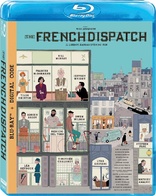
Movie rating
7.1 | / 10 |
Blu-ray rating
| Users | 0.0 | |
| Reviewer | 4.0 | |
| Overall | 4.0 |
Overview
The French Dispatch (2021)
The film is a love letter to journalists set in an outpost of an American newspaper in a fictional 20th Century French city and brings to life a collection of stories published in ‘The French Dispatch’ magazine.
Starring: Benicio del Toro, Adrien Brody, Tilda Swinton, Léa Seydoux, Frances McDormandDirector: Wes Anderson
| Drama | Uncertain |
| Romance | Uncertain |
| Comedy | Uncertain |
Specifications
Video
Video codec: MPEG-4 AVC
Video resolution: 1080p
Aspect ratio: 2.35:1, 1.85:1, 1.37:1
Original aspect ratio: 1.37:1, 2.35:1
Audio
English: DTS-HD Master Audio 5.1
French: Dolby Digital 5.1
Subtitles
English SDH, French, Spanish
Discs
Blu-ray Disc
Single disc (1 BD)
Digital copy
Playback
Region free
Review
Rating summary
| Movie | 4.0 | |
| Video | 5.0 | |
| Audio | 4.5 | |
| Extras | 0.0 | |
| Overall | 4.0 |
The French Dispatch Blu-ray Movie Review
. . .of the Liberty, Kansas Evening Sun of the New York City New Yorker.
Reviewed by Jeffrey Kauffman January 25, 2022What is it with Wes Anderson and place names in titles? While Rushmore actually took place in Texas, its title almost by default conjures visions of a certain mountainous piece of art. By contrast, The Darjeeling Limited, The Grand Budapest Hotel and now The French Dispatch of the Liberty, Kansas Evening Sun all feature at least some kind of tangential connection to their titular locales (even if the lodging facility named is in the fictional country Zubrowska), though this latest film has the benefit of offering two place names in its unredacted title. All of this is simply prelude to my admittedly stupid joke (you were expecting any other kind of joke from me?), which is namely: why doesn't Wes Anderson just bite the bullet, engage in a bit of truth in advertising, and start calling all his films The Russian Nesting Dolls in Cinematic Form? Tim Burton may have gained a certain notoriety for having reimagined Alice in Wonderland, but there's arguably no director more facile at "going down a rabbit hole" than Anderson, as evidenced by the fact that within mere minutes, maybe seconds, of The French Dispatch beginning to unspool, there are manifold strata of story being offered. The main framing device in the film involves the last issue of a newspaper (remember those things?) called The French Dispatch of the Liberty, Kansas Evening Star, a title it came to since it was founded by one Arthur Howitzer, Jr. (Bill Murray), who started writing for his father's paper ( The Liberty, Kansas Evening Star) while junior was in France. The film begins with junior's demise, and the ramifications of his will insisting that The French Dispatch immediately cease publication (with one final sign off issue). The rest of the film is a kind of quasi-portmanteau which offers cinematic "versions" of various articles in that final issue.
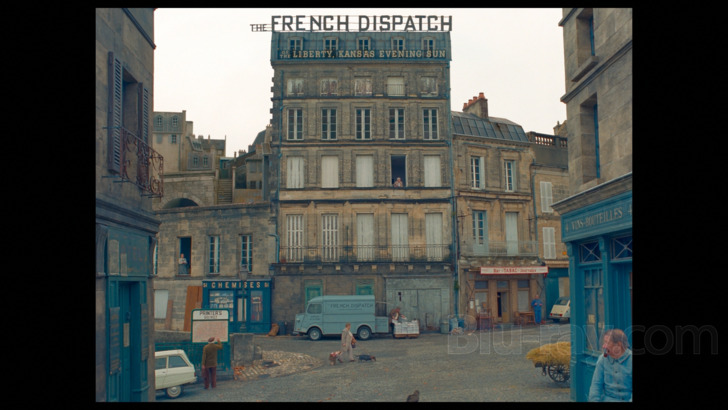
For an auteur who so flamboyantly utilizes all that the medium of motion pictures can offer the way Anderson regularly does, it's kind of charming in a way that this film was designed as a "love letter" to journalists, and specifically to those who toiled in print media. That said, the whole "newspaper" angle is arguably a bit of a "McGuffin" (to purloin a term championed by another iconic auteur). The "stories" themselves are an odd lot of semi-connected sagas, all of which take place in the hilariously named French village of Ennui-sur-Blasé. Owen Wilson appears as a cycling tour guide named Herbsaint Sazerac, just one of several ostensible writers who work for Howitzer, and a guy who repeatedly crashes his bike while offering views of the place, but who nonetheless is able to demonstrate that the "march of progress" in the town may have been more of a leisurely stroll, so to speak.
Three vignettes of various lengths and complexities then are offered, supposedly based on articles that appear in the final edition of The French Dispatch. The first of these involves a purportedly insane painter named Moses Rosenthaler (Benicio del Toro), who has been consigned to the local prison cum asylum, and who is contacted by another prisoner, a tax evader named Julian Cadazio (Adrien Brophy), who arranges to purchase an abstract by Rosenthaler. Suffice it to say Rosenthaler becomes a cause célèbre, but when Cadazio attempts to buy more work from Rosenthaler, certain "obstacles" arise. This story has its own "meta" aspect courtesy of a framing device (you need to keep track of framing devices, in case that's not already clear) involving an art historian and writer for The French Dispatch named J.K.L. Berenson (Tilda Swinton), who is recounting the entire story at a lecture.
Next up is a story that might be termed Godardian, if it weren't for the fact that the directorial approaches of Anderson and Godard could hardly be more different. That said, there's a "revolutionary fervor" in this second tale which would be perfectly at home in some of Godard's more provocative sixties films. Lucinda Krementz (Frances McDormand) is profiling the kind of student activists who are part and parcel of any number of Godard outings, and perhaps forsakes journalistic objectivity by getting intimately involved with one of the main revolutionaries, the obviously referentially named Zeffirelli (Timothée Chalamet). By the time the "revolution" has become a play some years later, Anderson once again develops "meta" layers which may frankly introduce even more of an intellectual distancing factor than already can tend to be the case in his films.
The third story involves a food journalist named Roebuck Wright (Jeffrey Wright), and rather like the first vignette, there's an immediate "meta" aspect in that Wright is recounting an anecdote on a talk show which "becomes" the story. Rather unexpectedly (as if you can actually expect things in any given Anderson film), Wright gets involved in a kidnapping plot involving the son of the local police commissioner. This story has a number of whimsically named characters, including The Abacus (Willem Dafoe) and The Chauffeur (Edward Norton). For a little "meta" information of my own involving a real life personage Anderson reportedly based some characters in this film on (including Roebuck Wright), as well as a chauffeur, see my closing comments, below.
Note: My colleague Brian Orndorf was evidently much less swayed by The French Dispatch than I was. You can read Brian's thoughts here.
The French Dispatch Blu-ray Movie, Video Quality 
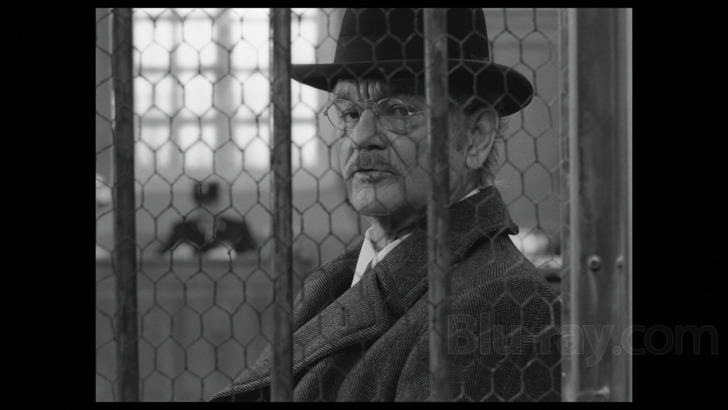
The French Dispatch is presented on Blu-ray courtesy of 20th Century Films' Searchlight imprint and Disney / Buena Vista with an AVC encoded 1080p transfer in a whole bunch of different aspect ratios (hey, this is a Wes Anderson film, after all). The IMDb offers a glut of cameras that were used, but this was shot on film and the DI was finished in 4K, with the results being as whimsical as you might expect in terms of things like mise-en-scène , but with a really beautiful accounting of both detail and a widely variant palette, which can range from candy colored to black and white. There's typically so much to take in in any given frame of an Anderson film it's almost hard to know where to begin, but the fine detail in the black and white sequences in particular really stood out to me and were consistently impressive. Some of the color footage has an "old time" bluish and yellowish tint which may recall some of the European color films from the middle of the 20th century, but, again, detail levels are almost always exceptional. Anderson toys with all sorts of things presentationally, including animated sequences, having "subtitles" appear all over the frame as various characters speak, and with interstitial texts supposedly culled from the actual newspaper (those with an interest are encouraged to select the French language version of the film and then see what happens to those moments). This is an incredibly complex piece of visual sleight of hand that will repay repeated visits, and this transfer supports the artifices employed extremely well.
The French Dispatch Blu-ray Movie, Audio Quality 
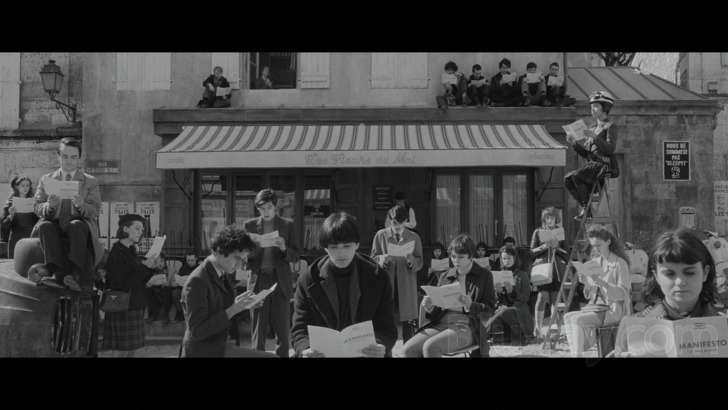
The French Dispatch has an enjoyable DTS-HD Master Audio 5.1 track which may not be quite as byzantine as the visual aspect, but which is still stuffed full of whimsical sound design elements. There are layers of narration, voice over and dialogue that keep spoken matters front and center, but both interior and exterior scenes often offer nice immersion courtesy of well designed and placed ambient environmental effects. A playful score from Alexandre Desplat also wafts through the side and rear channels invitingly. Optional English, French and Spanish subtitles are available.
The French Dispatch Blu-ray Movie, Special Features and Extras 
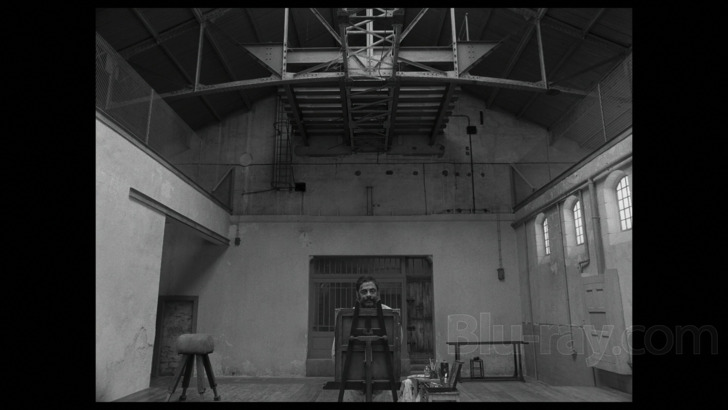
There are sadly no on disc supplements offered with this release (do I sense a deluxe Criterion Collection release in the offing?). A digital copy is included.
The French Dispatch Blu-ray Movie, Overall Score and Recommendation 
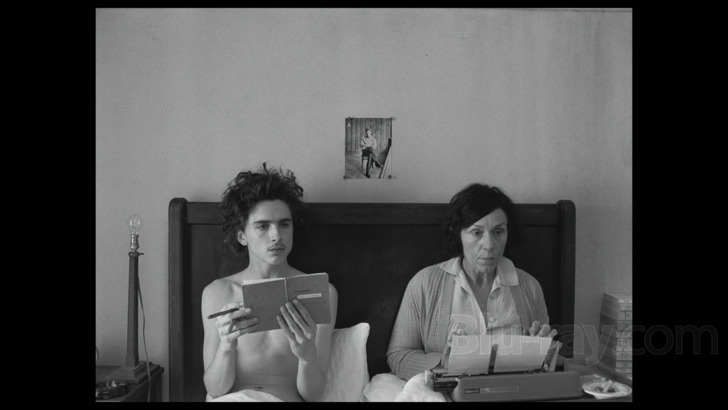
In doing some background research in preparation for writing this review, I stumbled across a kind of fun piece of trivia that has a connection to a "what if" release from what was once known as 20th Century Fox. One of the real life writers upon whom Anderson reportedly modeled some of the characters in The French Dispatch was noted journalist A.J. Liebling. Liebling was actually embedded with the World War II battalion my late father commanded, and some of Liebling's best known tales, which ran in The New Yorker and have since been dubbed "The Mollie Stories", were about my father's rule breaking driver, who might be compared to a World War II chauffeur version of Hawkeye in M*A*S*H. "The Mollie Stories" actually featured my Dad as a "recurring character", and sometime in the sixties none other than 20th Century Fox reached out to my Dad, who by then was a Major General, and put him on retainer as a technical advisor for a proposed Mollie film which, if I'm accurately remembering the hysterical shrieks from my elder sisters at the time, was slated to star Paul Newman. That movie sadly never came to pass, but the legacy of fantastic writers like Liebling and so many others is lovingly recognized by Wes Anderson in this hugely appealing, if deliberately flat out weird, film. Is it too much at times? Probably, though in an "art form" which seems to almost pride itself on appealing to the lowest common denominator, excess like this can be a breath of fresh air, even if it's also a bit of a whirlwind. If you're an Anderson fan, you'll at least have some inkling of what to expect (with, again, expectations being a risky gambit with regard to Anderson); if you're a newcomer, hold on tight, because everything from characters to storylines to aspect ratios to palettes are going to shift unexpectedly. Technical merits are solid and even without any supplements, The French Dispatch comes Highly recommended.
Similar titles
Similar titles you might also like

Moonrise Kingdom
2012

Rushmore
1998

Marriage Story
2019

Licorice Pizza
2021

Past Lives
2023

The Darjeeling Limited
2007

The Life Aquatic with Steve Zissou
2004

La La Land
2016

The Royal Tenenbaums
2001

Before Sunrise
1995

Before Sunset
2004

Before Midnight
2013

Asteroid City
2023

Do the Right Thing 4K
1989

The Apartment 4K
1960

(500) Days of Summer
2009

Annie Hall
The Woody Allen Collection
1977

Sideways
2004

Up in the Air
2009

The Holdovers
Collector's Edition
2023